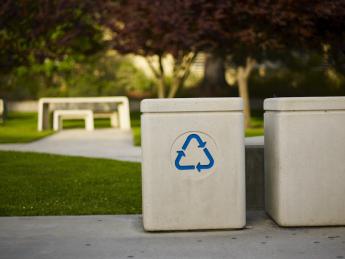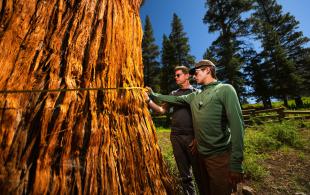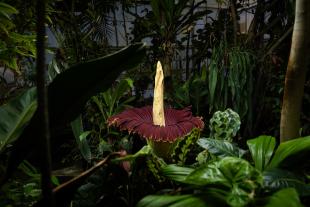CalRecycles Grant will Help Support University Recycling Efforts — And Fund Internships

A $225,000 state grant will help Cal Poly increase beverage container recycling and support other campus recycling programs as the university works to create a zero waste campus.
Cal Poly’s Energy, Utilities, and Sustainability Department will use the funds from the California Department of Resources Recycling and Recovery, or CalRecycle, to purchase and install about 690 blue beverage container recycling bins in interior/exterior hallways, courtyards and student dorm rooms, as well as a dozen sets of Big Belly solar compactor stations — smart, sensor-equipped waste and recycling stations that communicate real-time status to ground crews to enable efficiencies — in busy and high volume areas throughout campus.
Officials are planning to place the first four compactor stations in front of Campus Market, at the top of Mustang Way, in front of Kennedy Library, and on the ground floor of the R3 parking lot at Poly Canyon Village.
The grant also will provide Recycle Across America standardized signage for existing recycle and landfill bins — signs that have been shown to significantly increase recyclables collected and decrease contamination in communities across the nation.
Finally, the grant will pay for education, social media, outreach events and student staffing.
“The goal is that the new bins and signage will create a uniform message across campus about what is recyclable at Cal Poly, as well as making recycling more convenient,” said Anastasia Nicole, Cal Poly zero waste coordinator. “Successful grant implementation is expected to reduce disposal costs, increase diversion from landfill and increase student, staff and faculty understanding of the campus recycling system.”
According to the California State University sustainability policy, Cal Poly must reduce its per-capita landfill disposal 80 percent by this year, then continue toward zero waste.
In 2016 and 2017, Cal Poly achieved 90 percent and 86 percent diversion from landfill for all waste produced on campus, including traditional recycling of cardboard, paper, bottles and cans, construction and demolition debris, scrap metal, surplus equipment, and collection of food scraps, yard waste and animal manure for composting.
Diverting recyclables from the landfill to the recycling facility at Cold Canyon Landfill will aid Cal Poly in meeting its CSU zero waste goals and will reduce greenhouse gases associated with landfill waste.
The grant will also fund two years of student Learn by Doing recycling internships. Student interns will help manage all aspects of grant implementation, including baseline waste audits, data tracking and recycling outreach.
The latter will include a beverage container recycling education and outreach program, which will include social media, student videos, events and emails throughout the San Luis Obispo campus.
Funds were released in January and new bins and signage will be rolling out in this spring.
Sustainability has been a driving force at Cal Poly for decades, arising from the need to reduce operating costs and conserve limited natural resources. Since 2006, the university has tracked key performance indicators to measure progress toward campus and CSU goals for the management of energy, water, waste, greenhouse gas, transportation programs, and design and construction of buildings.
State law allows CalRecycle to issue each year up to $1.5 million in California Beverage Container Recycling Fund grants for beverage container recycling programs. For the 2019-20 fiscal year the fund awarded six grants worth almost $1.3 million, which ranged from $105,000 in Los Angeles County to $500,000 to the city and county of San Francisco.




